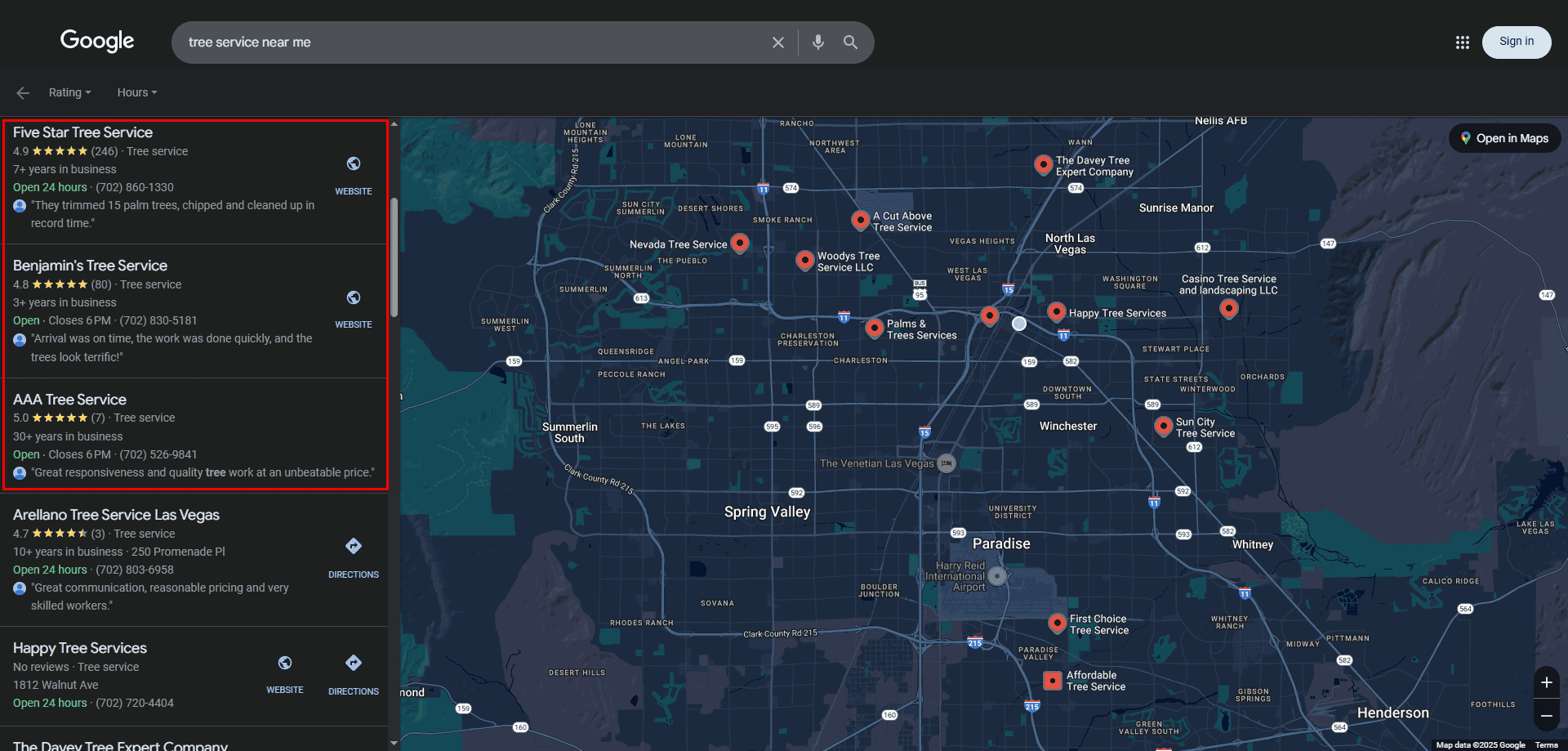Course 2: Local Market Domination Strategies
Learn the location-based optimization tactics that put your business in front of customers actively searching in your service area.

Lesson 1: The Local Results Monopoly That Controls Customer Flow
When potential customers search "carpet cleaning near me," Google displays a map featuring 3 businesses prominently - this local results section captures 75% of all search clicks. Ranking #4 essentially makes your business invisible to local searchers.
This local prominence appears for location-based searches: "divorce lawyer in Miami," "emergency locksmith," "bathroom remodeling contractor near me." Missing these top 3 positions means your competitors intercept customers who should be calling you.
Key Point: Local map rankings generate more valuable traffic than traditional search results - dominate these 3 spots to control your market.
Lesson 2: The Business Data Chaos Destroying Your Local Visibility
Search engines obsess over business information consistency. When your painting company appears as "Smith Painting LLC" on your website, "Smith Painting" on directory sites, and "Smith House Painting" elsewhere, Google assumes you're unreliable or attempting manipulation.
This inconsistency, known as NAP (Name, Address, Phone) fragmentation, represents the primary reason businesses struggle with local search performance. Google validates your information across hundreds of platforms, and minor variations like "Street" vs "St." damage your local rankings.
Most business owners remain unaware their information appears incorrectly across dozens of online platforms, continuously undermining their search performance.
Key Point: Inconsistent business information across online platforms confuses Google and devastates local search visibility - most businesses don't realize this problem exists.
Lesson 3: Multi-Location Domination While Others Struggle Locally
Wonder why certain concrete contractors appear in search results across multiple cities while you can't even rank in your hometown? They've mastered geographic targeting methodology.
Developing distinct, location-specific content for each service territory signals to Google that you're a genuine local business across multiple markets. Most businesses either completely ignore additional cities or create identical pages that Google dismisses as duplicate content.
Successful multi-location businesses have decoded area-specific optimization. Rather than simply listing served cities, they demonstrate unique understanding and engagement with each local market.
Key Point: Capturing multiple local markets requires sophisticated geographic targeting that most businesses fail to understand or execute properly.
Lesson 4: The Local Verification System Google Uses to Rank Businesses
Google doesn't simply want to confirm your massage therapy practice exists - it demands proof that you're an authentic, established business within your community. This verification process distinguishes businesses that dominate local search from those buried on page 2.
Google evaluates digital evidence that confirms your genuine connection to your local market. These authenticity signals prove you operate a real local business rather than a website claiming to serve areas from distant locations.
Without proper local verification indicators, you compete at a severe disadvantage. Businesses with strong community validation signals not only achieve higher rankings but maintain those positions through algorithm changes.
Key Point: Local authenticity verification determines long-term search success, but most businesses don't understand what validation signals Google requires.
Lesson 5: The Geographic Tracking Error That Wastes Advertising Budgets
Most pool service companies check their search performance from their office location without realizing local rankings fluctuate dramatically based on searcher location - you might rank #1 from your office but #9 in neighborhoods where your ideal customers actually live.
Without comprehensive geographic ranking monitoring across your entire service territory, you're making blind optimization decisions. You could be investing resources improving rankings in areas where you already perform well while ignoring territories where competitors dominate your potential customers.
Professional local optimization requires tracking performance from multiple locations throughout your service area to identify where you're succeeding and where you're losing market share.
Key Point: Local search rankings vary significantly by geographic location - you need comprehensive area monitoring to understand your true market position.